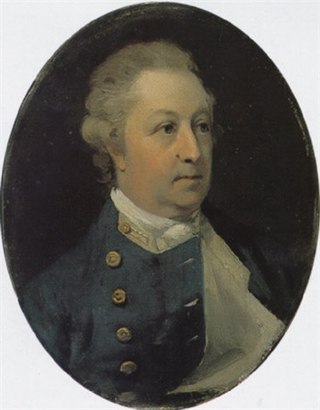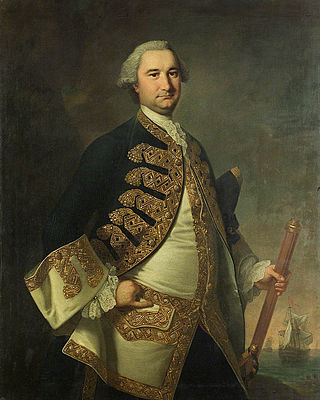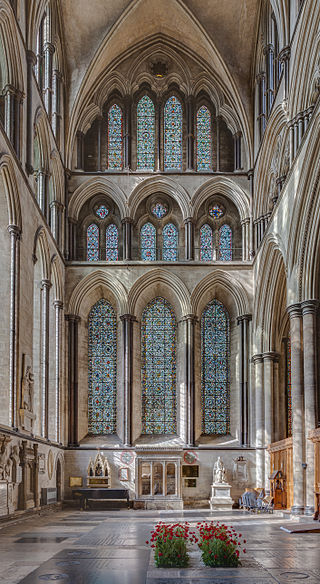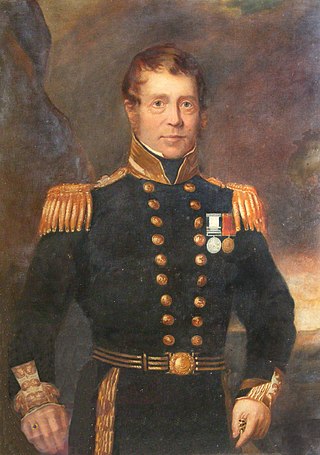Related Research Articles
Admiral Sir James Douglas, 1st Baronet was a Scottish naval officer and Commodore of Newfoundland.

Admiral Sir William Parker, 1st Baronet, was a British naval commander.
Admiral Sir Richard Hughes, 2nd Baronet was a British naval commander.

Admiral Sir Thomas Frankland, 5th Baronet was a British naval officer, MP and slave trader. He was the second son of Henry Frankland and Mary Cross. Frankland was born in the East Indies, his father being a member of the East India Company and briefly Governor of Bengal.
Thomas Huskisson (1784–1844) was an officer in the Royal Navy. Thomas Huskisson was half-brother of William Huskisson, the British politician.

Rear-Admiral Richard Tyrell was an Irish officer in the Royal Navy.

John Blyth or John Blythe was a medieval Bishop of Salisbury.

The Common Serjeant of London is an ancient British legal office, first recorded in 1291, and is the second most senior permanent judge of the Central Criminal Court after the Recorder of London, acting as deputy to that office, and sitting as a judge in the trial of criminal offences.

Admiral John Carter son of Thomas Carter and Catherine Butler of Castlemartin Co Kildare and grandson of Henry Boyle Carter, was an officer of the Royal Navy, who saw service during the French Revolutionary and Napoleonic Wars.

The First Lord of the Admiralty, or formally the Office of the First Lord of the Admiralty, was the political head of the English and later British Royal Navy. He was the government's senior adviser on all naval affairs, responsible for the direction and control of the Admiralty, and also of general administration of the Naval Service of the Kingdom of England, Great Britain in the 18th century, and then the United Kingdom, including the Royal Navy, the Royal Marines, and other services. It was one of the earliest known permanent government posts. Apart from being the political head of the Naval Service the post holder was simultaneously the pre-eminent member of the Board of Admiralty. The office of First Lord of the Admiralty existed from 1628 until it was abolished when the Admiralty, Air Ministry, Ministry of Defence and War Office were all merged to form the new Ministry of Defence in 1964. Its modern-day equivalent is the Secretary of State for Defence.
Rear Admiral Thomas Totty was a Welsh naval officer of the Napoleonic Wars.

The Cinque Ports Fleet was the a temporary formation of ships supplied to the crown from the Confederation of the Cinque Ports for particular naval expeditions during particular campaigns of the Kingdom of England from 1260 to 1558.
Matthew Locke was an English administrator, holder of the post of Secretary at War from 1666 to 1683, when he sold it.

Admiral William Parry was a Royal Navy officer who served as Commander-in-Chief of the Jamaica Station.
Rear-Admiral Donald Campbell (1788–1856) was a Royal Navy officer who commanded the Leeward Islands Station.
Admiral Robert Man (1721–1783) was a Royal Navy officer. He commanded the third-rate HMS Lancaster at the siege of Louisbourg in June 1758 during the French and Indian War. He went on to become commander-in-chief of the Leeward Islands Station, then Commander-in-Chief, Mediterranean Fleet and finally First Naval Lord.
Rear Admiral Robert Swanton (c.1710–1765) was a Royal Navy officer who became commander-in-chief of the Leeward Islands Station.
The Newfoundland station was a formation or command of, first, the Kingdom of Great Britain and, then, of the United Kingdom's Royal Navy. Its official headquarters varied between Portsmouth or Plymouth in England where a squadron of ships would set sail annually each year to protect convoys and the British fishing fleet operating in waters off the Newfoundland coast and would remain for period of approximately six months based at St. John's Harbour. In 1818 the station became a permanent posting headquartered at St John's. It existed from 1729 to 1825.

The Admiral of the North and West or Admiral of the North and Western Fleets was a former senior appointment of the English Navy. The post holder was Commander-in-Chief of the English navy's North and Western Fleets operating in the North Sea, the English Channel, the Southern Irish Sea and Atlantic from 1364 to 1414.
Admiral Sir Peter Bard was an English Knight and naval officer who held a number of important commands of the Navy Royal from 1314 to 1336. and Admiral of the West from 1314 to 1315 and again from 1338 to 1339. Vice-Admiral of the West in 1337. and Admiral of the Fleet of the Cinque Ports from 1335 to 1336.
References
- ↑ Haydn, Joseph Timothy; Beatson, Robert (1851). Beatson's Political index modernised. The book of dignities; containing rolls of the official personages of the British empire, together with the sovereigns of Europe, the peerage of England and of Great Britain; and numerous other lists. p. 212.
John Best yeoman guard.
- ↑ Haydn, Joseph (1851). The Book of Dignities: Containing Lists of the Official Personages of the British Empire ... From the Earliest Periods to the Present Time ... Together with the Sovereigns and Rulers of Europe, from the Foundation of Their Respective States; the Peerage of England and Great Britain. Longmans, Brown, Green and Longmans. p. 212.
John Best yeoman guard.
- ↑ "Captains". Archived from the original on 11 June 2019. Retrieved 11 October 2010.